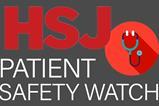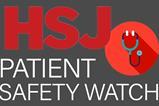HSJ is now hosting the Patient Safety Watch newsletter, written by Patient Safety Watch chief executive James Titcombe.
Just as this newsletter was finalised, the dreadful news was announced that Lucy Letby had been found guilty of the murder of seven babies and attempted murder of six more while working as a neonatal nurse at the Countess of Chester Hospital. There are no words to express my sadness, shock and disbelief.
The verdict represents one of the worst acts of wrongdoing in the history of our NHS. The implication of this news will be profound and felt for years to come.
My thoughts and prayers are with the families affected.
The rest of this newsletter was written prior to this news being announced.
Good afternoon and welcome to this edition of the Patient Safety Watch newsletter.
This edition includes a guest blog from Matthew McClelland, Nursing & Midwifery Council executive director of strategy and insight, focusing on the NMC’s recent Spotlight on nursing and midwifery report – a highly recommended read! But first, here is the usual round up of patient safety news and reflections over the past two weeks.
Maternity legal claims on the rise
The last edition of the Patient Safety Watch newsletter pointed out that the most recent set of NHS Resolution accounts revealed a rise in the amount being spent on settling legal claims against NHS organisations. However, a more recent story in the Telegraph focused on a rise in the number of claims lodged against the health service relating to maternity care, with 1,392 in 2022-23 compared with just 1,013 three years ago in 2019-20.
Action against Medical Accidents CEO Paul Whiteing told the newspaper: “It is a sad fact that maternity wards up and down the country are not improving the safety practices, hence we are still seeing so many mothers and babies being needlessly harmed.” Royal College of Midwives chief executive Gill Walton added: “It shouldn’t take major incidents for the government to pay attention to maternity safety. Each one has a devastating impact on the families and staff involved.”
There must be a better way….
Time to cut the blame game
Rachel Sylvester wrote a powerful column – Time to cut the blame game amid another NHS childbirth scandal – in the Times earlier this week, reflecting on personal experience, wider themes affecting maternity safety and making the case for litigation reform: “A flawed compensation system also drives a cover-up culture. Clinical negligence claims for failings in maternity care can total millions of pounds. The stakes are therefore incredibly high and the legal nature of the process means the claimant has to prove negligence to get an award. That makes it very hard for doctors and midwives to admit to, and therefore learn from, mistakes or for the NHS to improve its processes.”
Ms Sylvester points to New Zealand’s “no fault” compensation scheme (Sweden and Japan also operate similar systems) as a better solution.
Over the last decade, numerous national inquiries and programmes aimed at preventing maternity tragedies have fallen short of the transformation promised. In my view, it is now time we acknowledged that our current litigation system is one of the factors impeding our ability to make progress.
Ms Sylvester’s column triggered a number of responses, including a thoughtful letter from AvMA CEO Mr Whiteing and a letter from yours truly published in the Times. Let’s hope that there will be continued debate about this area and movement towards ensuring reform becomes a national priority.
CQC slams ‘chaotic’ maternity services at St George’s
Yet more concerning maternity news. Yesterday, the Care Quality Commission published a damning inspection report raising serious safety concerns about maternity services at St George’s.
Carolyn Jenkinson, CQC’s deputy director of secondary and specialist healthcare, said: “When we inspected maternity services at St George’s Hospital, it was concerning to see a deterioration in the standard of care being delivered.
“Both staff and people using the service were being let down by leaders who failed to respond quickly, resulting in care that was unsafe, and in the delivery suite, also chaotic.
“We saw some baby deaths weren’t investigated as serious incidents and investigations didn’t always take place in a timely way… This is unacceptable and put people at risk of avoidable harm from mistakes being repeated.”
Maternity campaigner Catherine Roy posted an informative thread summarising the key issues the CQC found here.
Before moving away from maternity safety, this week bereaved mother Emily Barley gave an interview to LBC about the death of her daughter Beatrice and her thoughts about maternity safety and the changes needed. Powerful, dignified and, for those interested in maternity safety, an essential listen.
In other news…
Sharp spike in incidents related to staffing on mental health wards
A series of freedom of information request responses, obtained by the Nursing Times, has revealed a sharp rise in the number of Datix reports at mental health trusts citing staffing problems. Information received from about three-quarters of England’s mental health providers revealed there were 11,073 reports on Datix systems – where clinicians log adverse events – related to short staffing in 2022, compared with 6,957 in 2019. This number peaked during covid, with 11,453 such reports during 2021.
As always, we need to be cautious in how such information is interpreted as an increase in reporting of incidents can also indicate a positive shift in reporting culture, but the analysis highlights some important insights.
Cut to vaccine payments a safety risk, says BMA
The British Medical Journal has reported that the British Medical Association has said an NHS England decision to cut the payment to GPs to deliver the covid vaccine by a quarter “undervalues general practice and threatens the safety of vulnerable patients”.
The current payment of £10.06 for each vaccination will drop to £7.54 from September.
New guidance on recording patient safety incidents
To help support the rollout of the Learn From Patient Safety Events system, NHSE has published guidance for users of the service, covering in particular how to select the most appropriate level of harm when recording incidents. This would help ensure the information recorded was accurate and was consistent and comparable between organisations, the guidance said.
The guidance also stressed that “if in doubt, it is always better to record a patient safety incident using the available information and best judgement”.
Prescribing safety – independent review of the Prescribing Safety Assessment published
A new independent report, chaired by Professor Dame Jane Dacre, looking at the Prescribing Safety Assessment has been published.
The report’s six recommendations included: maintaining mandatory prescribing assessment; standardising and publishing examination regulations; regulatory oversight from the General Medical Council; and ensuring the PSA is taken prior to entry to clinical practice.
Professor Dacre said: “The healthcare landscape is increasingly complex, and in a state of continuous change. It is imperative that patient safety remains at the heart of clinical practice within this difficult environment. Some of the recommendations will require further detailed discussion, and a generous timeframe for implementation, but overall, they are sensible, pragmatic, and in the best interest of patients and prescribers.”
The power of words
A final share for this edition. Twitter (yep, that’s what I’m still calling it!) has its negative side, but it can be a powerful tool for gathering and sharing experiences and views. Last week, I asked followers for examples of “formal NHS communications that have caused hurt/compounded harm”. Some responses made for difficult reading. Casting aside any judgements or blame, some of the responses highlight themes and learning that might be useful reflection for everyone, especially those working in comms or family engagement roles.
That’s all for this edition, but, before going, please do read our guest blog below.
Thanks for reading and stay safe.
James Titcombe
A spotlight on nursing and midwifery – Guest blog by Matthew McClelland
Earlier this month, we published Spotlight on nursing and midwifery, the NMC’s first insight report. Spotlight combines data from our regulatory work, specially commissioned insight, and pre-existing research to shine a light on opportunities for learning and improvement.
What have we found?
No matter how well their education or previous experience equips them, newly registered professionals can find it daunting moving into professional practice and their early experiences can impact their confidence when caring for people. While many of the newly registered nurses, midwives and nursing associates we spoke to felt happy and confident, the majority also told us they’d welcome more support as they navigate their way through staffing shortages and demanding workloads.
Preceptorship programmes are invaluable: they support newly registered professionals to integrate into their workplace and grow in confidence. However, there’s wide variance in the way programmes are delivered across employers, with only a minority of new professionals feeling highly satisfied with their preceptorship experience. Professionals with poor experiences of preceptorship feel less confident in their ability to practise safely. More consistently high-quality preceptorship programmes – building on our preceptorship principles – would help all newly qualified professionals to practise confidently and safely.
Careful thought and attention are required to the support newly registered professionals need to thrive. Many told us they are shocked and overwhelmed by their workload, leaving them feeling tired and burned out. In fact, nearly half of internationally educated professionals we spoke to found the workload in the UK worse than they expected.
Many internationally educated professionals are also enduring racism and discrimination – which is completely unacceptable. Participants in our pilot ‘Welcome to the UK Workforce’ workshops for new international recruits told us they felt well-supported by their employers throughout their arrival and preparation for practice. However, some went on to share shocking feedback about their experiences in practice. They don’t feel respected or treated the same as UK-educated colleagues. They’ve experienced racist and derogatory comments, and have been talked about behind their backs. They’ve spoken of a toll on their health, of feeling traumatised, and of a sense of having been misled by recruitment processes. Alarmingly, they feel resigned to all this ‘just being how things are here’.
Research stretching back many years shows that discrimination against safety critical professionals has a corrosive effect on workplace relations and gets in the way of effective care, leading to worse health outcomes for people. As the nursing and midwifery professions become increasingly diverse – more than a fifth are from outside the UK and well over a quarter are from Black, Asian, and minority ethnic backgrounds – tackling racism becomes an ever more urgent safety issue.
The discrimination they face may be one of the reasons why internationally educated professionals make up the largest proportion of nurses and midwives leaving the register within five years of registration. But there are other factors at play. Many newly registered professionals mention staffing, pay and burnout as reasons for leaving. Looking at the bigger picture, more than half of all professionals leaving within the first five years did so earlier than they planned. Tackling the underlying factors could help retention of talented professionals and improve safety and quality of care.
Many of the pressures professionals experience are exacerbated by poor workplace cultures, a common theme from inquiries into maternity care in England. Our fitness to practise data also shows that when maternity care goes wrong, common factors include poor communication between colleagues, and with women and families, with people reporting that their midwife failed to listen to them.
Spotlight further highlights how poor communication and delays in escalating care in emergency situations can cause serious failings in maternity care. Our code and standards for midwives are clear that every midwife should always advocate for peoples’ individual needs, views and preferences, and should escalate concerns when something isn’t right. We’ve issued practical resources for both midwives and pregnant women, The best midwifery care happens in partnership, aimed at addressing these critical safety issues.
What next?
Nursing and midwifery are among the most trusted professions in the UK. That reflects the safe, kind, and effective practice of 788,000 people on our register. By shining a light on some of the issues and safety concerns facing our professions, Spotlight aims to provide a basis for learning and improvement. These issues need to be addressed with urgency, but they won’t be resolved overnight. Shifting the dial will need all of us – regulators, policy-makers, employers, professionals – to maintain our shared commitment to safety, learning, and improvement.































No comments yet